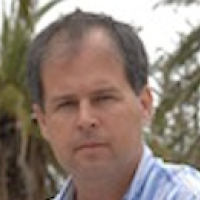
Alonso Hernández Guerra
Alonso Hernández Guerra (Las Palmas de Gran Canaria) is a professor at the Universidad de Las Palmas de Gran Canaria, a specialist in physical oceanography. He teachs this subject at the Faculty of Marine Sciences of this university and the author of more than 80 research articles in this disciplinary field.
Alonso Hernández Guerra graduated in Physics from the Universidad de La Laguna in 1984 and, subsequently, in 1990, he defended his Ph.D. in Physical Oceanography at the Universidad de Las Palmas de Gran Canaria (ULPGC) that was mainly carried out at the Joint Research Center (JRC), belonging to the European Commission and located in Ispra (Italy). Since 2003 he has been Professor at the Universidad de Las Palmas de Gran Canaria and coordinator of the research group called IOCAG: Physical Oceanography. From 2019, he has been considered an Outstanding Researcher of the ULPGC.
His research began in remote sensing applied to studies of oceanographic features developed in the ocean surrounding the Canary Islands. From these remote sensing studies, it is worth highlighting the paper, result of his Ph.D., describing the mesoscale features around the Archipelago. They are upwelling filaments that extend from the African upwelling system to the islands, and eddies in the lee of the islands generated by the disruptive effect of the islands on the flow of the Canary Current. After this study, he has collaborated on numerous articles focused on various aspects of these features and has become one of the most active research areas of the ULPGC.
From 1996 to 1999 he participated in the European Union project called CANIGO, focused on the analysis of the circulation of the Canary Current. Once the project was ended, he began a research collaboration with the Instituto Español de Oceanografía (IEO) of Tenerife, to jointly carry out the research study of the Canary Current through the Radiales Profundas de Canarias (Raprocan). These investigations have been completed through different national and regional projects, which have allowed to estimate the Canary Current. One of the most interesting results of these studies is the relationship between the seasonal variability of the Canary Current and the Meridional Overturning Circulation (MOC), which determinates the global climate.
In 1999 he spent a sabbatical year at the Woods Hole Oceanographic Institution (WHOI) in the United States to collaborate with the renowned physical oceanographer Terrence M. Joyce. Thus, he started the studies of large-scale circulation in the Atlantic Ocean. In 2011-2012, he spent a research stay through a new sabbatical year at the Scripps Institution of Oceanography (SIO, California) to collaborate with another figure in physical oceanography, Lynne D. Talley. On this occasion, he studied the upwelling processes of the MOC taking place in the Indian and Pacific Oceans.
In 2011, he promoted the Instituto Universitario de Oceanografía y Cambio Global (IOCAG) of the ULPGC. He was its first elected director during the period 2012-2022. In 2020, the IOCAG received the Can de Plata de la Ciencia from the Cabildo of Gran Canaria for its climate change studies. Likewise, the ULPGC appears as one of the four Spanish universities with the first place in the Shanghai ranking in the field of Oceanography in 2023.
In 2015, Alonso Hernández Guerra was appointed member of the Comité Científico de Contaminación Marina by the Ministerio de Fomento. In 2018, he promoted, together with José Luis Pelegrí, the Océano y Clima Unit of the ULPGC, a Unit Associated to the Consejo Superior de Investigaciones Científicas (CSIC). Since 2019, he has been a member of the Comité Español de Observación Oceánica and, since 2022, he has belonged to the executive committee of the international GO-SHIP consortium. Since 2023, he has been a member of the Comité Externo de Asesoramiento Científico del Centro Nacional Instituto Español de Oceanografía, belonging to the CSIC.
Alonso Hernández Guerra has participated widely in informative activities in the media. He has cooperated with public institutions through Interreg projects with the main objective of improving cohesion policy through the exchange of experiences in the Macaronesia and neighboring countries. Currently, he collaborates in a Life project (2023-2030) of the European Union, which aims to adapt island coasts to the effects of climate change. He participates in the UN-sponsored project called Ocean Cities, as part of the Decade of Ocean Sciences for sustainable development from 2021 to 2030.
He has supervised numerous undergraduate and master's students and a total of eight Ph.D., four of which have obtained the Extraordinary Doctorate Award. Three of these Ph.D. students are Profesores Docentes e Investigadores (PDI), with the category of catedrático, titular de Universidad y profesora contratada doctora, respectively; another is a titular científico en el Instituto Español de Oceanografía of Tenerife; two others belong to high school teaching staff; another student has created a technology development company related to Oceanography; and the last PhD student which finished in 2023 has obtained a postdoct at Georgia Technology in the United States. Special mention deserves María Casanova, a doctoral student with a promising future, with 5 Q1 articles as first author, who passed away in an unfortunate diving accident shortly before the defense of her Ph.D.
Research interests
Large-scale Ocean Circulation